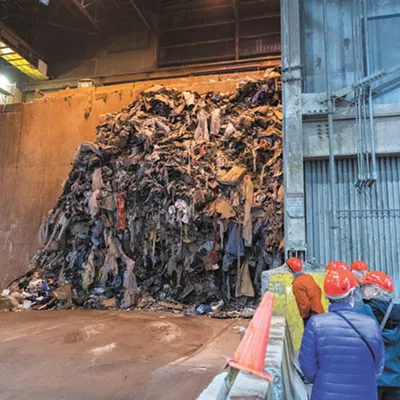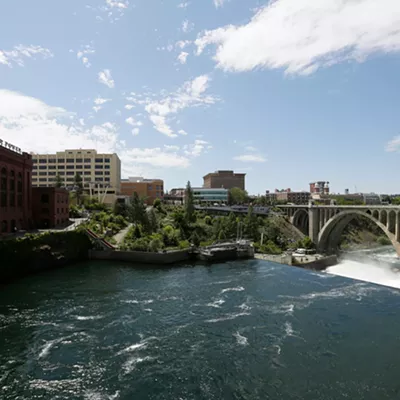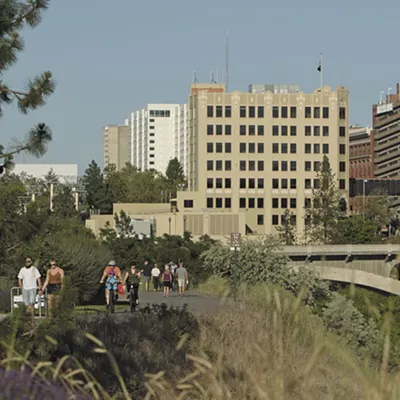
Reading legislative agendas isn't usually an interesting exercise.
Prepared to showcase an organization's priorities and give guidance to staff, cities often use these formal documents to list projects for which they are seeking state funding or bills they'd like to see passed by the legislature. They're helpful to direct lobbying efforts, but unless you work in government, they're not usually a topic of public conversation and debate.
That's what made Spokane City Council's document for Olympia's legislative session, set to get underway in the coming days, so interesting. While it includes the usual capital budget requests and a laundry list of "priority issues," one proposal from the legislative agenda has attracted genuine curiosity, from council members, members of the public and even a niche group of online economics nerds: a pilot program allowing the city to test a land value tax (LVT).
Let me explain.
Washington's property tax system is one of the most convoluted in the country, which has inspired many calls for reform over the years. But at the most basic level, it levies the same tax rate on both the land itself and the buildings on top of it. A land value tax, by contrast, would either not tax buildings at all, or establish a separate rate for land and improvements. Broadly speaking, it's a form of property tax based on land value alone, without considering the value of the buildings and other improvements on top of it.
For the owner of a typical single-family home in a typical neighborhood, this system would almost certainly result in slightly lower property taxes. But for the owner of a vacant lot in downtown or a burgeoning district like Garland or South Perry, property taxes would likely go up.
During its meeting in December, council members debated the potential benefits and burdens of such legislation, apparently out of genuine curiosity, passionate interest and, in some cases, a well-intentioned fear of unintended consequences. Council member Jonathan Bingle, for example, expressed a fear that it could result in increased property taxes in his generally lower-income district. Council member Kitty Klitzke, on the other hand, noted that this model would eliminate the tax penalty that comes from, for example, adding a bedroom to your home as your family grows, or adding an in-law apartment above your garage.
Personally, I find the concept tantalizing for another reason: It would help address an issue that has hampered redevelopment in downtown Spokane for decades.
...Pittsburgh experienced a substantially higher level of new construction than similar Midwestern cities without land value taxation.
tweet this
Currently, more than a third of downtown land is occupied by surface parking. Over the past few years, local officials, like former Council President Ben Stuckart, have tried to encourage developers to build new housing there through creative use of our existing incentive tools. But they've been hampered by our state's broken tax code. Fundamentally, because these lots don't have any buildings on them, property taxes are relatively cheap, allowing owners to "sit" on plots of land even in extremely desirable locations, like adjacent to Riverfront Park.
A land value tax would tax this property more fairly based on its valuable location, penalizing speculators and instead incentivizing owners to get busy and redevelop the land. Developers would also not see a tax penalty for construction, meaning they'd be incentivized to include as many housing units or as much office space as zoning allows.
This development effect is borne out from real-world experience. When the Federal Reserve Bank of Chicago analyzed Pennsylvania's land value tax system, for example, it found that even controlling for factors like differences in the economy, Pittsburgh experienced a substantially higher level of new construction than similar Midwestern cities without land value taxation. This should help assuage the concerns of the business community, which might fear the uncertainty of a new model for taxation.
Washington's property tax system isn't going to change overnight, and there are many conversations and debates to be had about how to set up the most equitable structure that stabilizes government funding and supports economic growth. The legislature also has a lot of priorities this session, including preparing for a second Trump administration and closing a roughly $15 million budget deficit. Indeed, even Spokane's request for a pilot program relies on a generous interpretation of the state constitution's requirement for "uniform" taxation.
But as legislators return to Olympia, they'd be wise to think beyond nibbling around the edges of a broken system that results in perverse outcomes and instead begin planning for — and piloting — the larger reforms we need. ♦
Anthony Gill is an economic development professional and writer of Spokane Rising, an urbanist blog about ways to make our city a better place to live.























